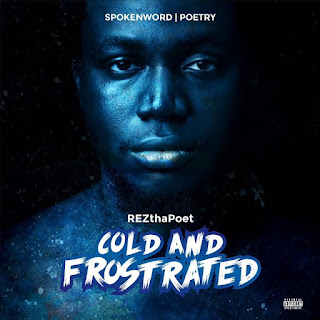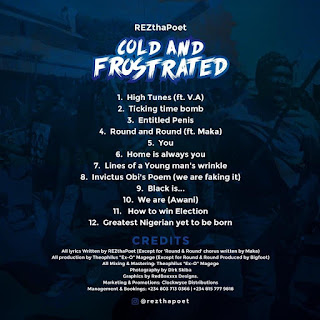What are the major themes you’ve explored in this album?
The main theme explored is “frustration” in different contexts.
Of being young and Nigerian. Of being less privileged, member of an abusive society, of gender relationship dynamics around responsibilities & commitments, and lastly the frustrations that come with navigating ethnic and racial identity.
How do you feel with a new poetry album? As this is not a regular art across the circle
A new poetry album for a Spokenword artiste as I, is another outlet beyond the stage especially with the limitation of practicing social distancing. Also people can forget most of what was said on stage, but a book or an album affords the audience to return and engage the work overtime.
Whilst I do not want to presume what is implied by ‘regular’ art which doesn’t sound right to my ears, I’m more pre-disposed to classification by mainstream/popular art vs Niche art. Niche can vary in size relative to the mainstream. To link it back to the need for an album, there is a growing niche of young audience, for Spokenword and Poetry that I’ve watched expand greatly in the last decade. There is hardly any major city you go today in Nigeria where there isn’t a culture gathering involving Spokenword, many local radio shows across the nation are now targeting Spokenword audiences and online movements.
The break-even point isn’t here yet but there is indeed an audience, so as this poet has lots to say and there is a growing audience especially in the current Covid-19 clime, there is a lot that an artistic expression such as this album can do to move conversation and consciousness forward, especially in this Covid-19 time.
Do you have spoken word artists that you look up to or that inspire and influence you?
Saul Williams and Professor Niyi Osundare are my biggest influences. There is also Gil Scot Heron whom I take mentorship in Spokenword presentation approach, especially when I use musical sounds.
I’m greatly inspired by Baba Olarewaju Adepoju who is a very successful poet of the modern era – the defacto poet of the current Alafin; and Odolaye Aremu, Tubosun Oladapo and even baba Sikiru Ayinde Barrister , though not spokenword or ewi exponent – he’s a fuji artiste that is a big favorite of my dad hence the influence on my work.
How long has it taken you to finish this work ? How was the process like?
From a writing perspective, it’s as long as I’ve been writing spokenword pieces. There are pieces on the album written between 9-13 years, and there are those that were written during the recording of the project. For audio production, mixing and mastering – that took a process of a year and half. Mainly because I was recording 2 other albums on the side.
For how long have you been into the spoken word business?
I’ve been writing and performing spokenword for about 14 years now.
Are there other things you’ll like to let us know about your poetry or the new work?
This work is a collection that explores the reality of the young African and the situations that have numbed us. But being numb is dangerous. Every person – young or old will find a piece of themselves in this project. And the accompanying music is beautiful too. I’l prefer people are pleasantly surprised rather than giving the entire theme & direction of the album away in this interview.
My previous works have tried to either explore cultural silences (poetry about topics we only discuss in hush tones) or experimental in exploring culture, language and identity.
Overall, the aspiration of my works is to explore our human experiences in the most authentic and relatable voice as a poet and scribe of the culture and the contemporary times.
Every time I get on social media or tune into the conversation we are currently having as a society – I see echoes of topics I’ve tried to speak to or educate on, on the album. This involves Consent in sexual relations, raising better men for the greater good of the society, reality of disadvantaged young people, our hypocrisy as a people & the overall dynamics of our socio-politico interactions as a society.



